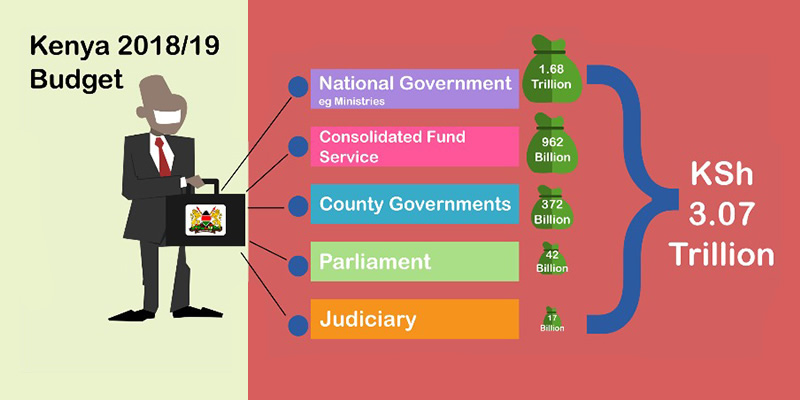
At Sh3 trillion (US$29 billion), Kenya’s budget for the 2018/2019 financial year is the highest spending plan in Kenya’s financial history, an increase of 10% from the previous financial year. According to Treasury, just over half or Sh1.74 trillion (US$19 billion) will be raised through taxes and government fees while another Sh558 billion will be raised from domestic and external borrowing, including concessional loans which, via a combination of lower interest rates and longer grace periods, are acquired from donor countries and institutions on terms substantially more generous than market loans. However, this will still leave a Sh772 billion hole in the government’s books.
The budget has been widely observed as a balancing act between implementing the strategic big four agenda -boosting manufacturing activities, enhancing food and nutrition security, achieving universal health coverage and supporting the construction of at least 500,000 affordable houses by 2022 – and financing other government commitments.
However, the budget hits ordinary consumers the hardest through increases in taxes on essential goods and services, including flour and bread, fuel and electricity. Further, a 0.5% tax on employee’s gross monthly salary to go to the National Housing Development Fund alongside a matching contribution by employers, has been introduced. The well-heeled will also pay more for high powered luxury vehicles, duty on which has been increased from 20% to 30%.
The budget comes against a backdrop of massive corruption scandals that have stalked the Jubilee administration since it came into power in 2013.
Sources: National Assembly’s Budget and Appropriation Committee, Central Bank of Kenya (CBK), Ethics and Anti-Corruption Commission (EACC) 2016/17 Report and newspaper reports.
Written by Joe Kobuthi, compiled by Juliet Atellah and designed by Bwana Mdogo.








